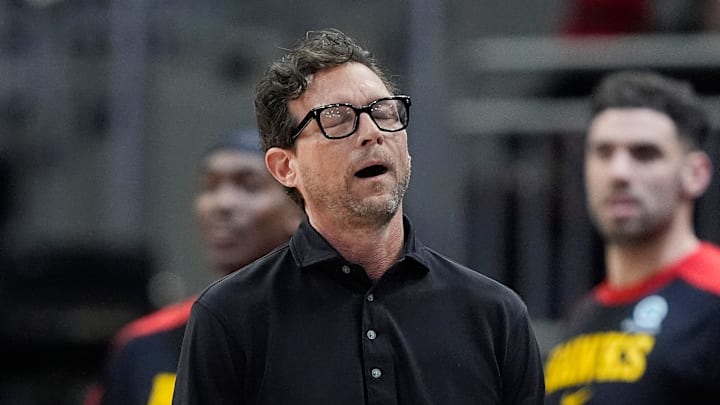The Atlanta Hawks traded De’Andre Hunter to the Cleveland Cavaliers at the 2025 deadline in February, and the immediate response was that the move helped both teams in various ways, but that the Cavs put themselves over the top.
However, opinions on who “won” the trade have lingered even after several months have passed.
With the Cav’s earlier than expected exit from the playoffs, now is good time to reevaluate.
NBA insider Jake Fischer, aka “The People’s Insider” detailed the fallout from the Cavaliers’ second-round playoff loss. Among the items, Fischer noted that the Hawks took on the Cavaliers’ “assignment” with Caris LeVert, who is an unrestricted free agent.
Moreover, the Hawks also acquired veteran forward Georges Niang in that deal. Niang in entering the final year of his deal. Both players contributed to the Hawks’ late surge.
The two-for-one player swap eased a significant burden on the Cavs.
“Cleveland's early exit has people talking, too,” Fischer wrote on May 16. “Their aggressive move at the trade deadline to add De'Andre Hunter from Atlanta was made with both the present and future in mind. Sorting out Caris LeVert's free agent future is now the Hawks' assignment; acquiring Hunter for LeVert and Georges Niang not only filled an immediate need for Cleveland on the wing but also enabled it to evade the luxury tax this season.”
“The financial savings in February were widely interpreted as a means to create as much financial flexibility as possible moving forward for needed roster tweaks rather than as a directive to cut costs.”
Notably, Fischer wrote that Cavaliers owner Dan Gilbert is comfortable paying into the luxury tax for a title contender, and that that is indeed how the organization views itself.
In essence, though, the Hawks missed an opportunity to call the Cavaliers’ bluff.
Surely, the Cavs could and perhaps would have found another trade partner that would have absorbed LeVert and Niang’s contracts. Whether or not they would have received a player of Hunter’s ilk in a different deal is but one significant X-factor.
Hunter, who has two more years on his four-year, $90 million pact, did not perform up to snuff in the postseason, an issue that is now the Cavs’ assignment to deal with.
He also has an extensive injury history that, on its own, justified trying to find a trade for him.
Hawks can view De’Andre Hunter trade as a win
Financially, the Hawks also provided themselves with flexibility; another win for an ownership group not unconcerned about spending and the luxury tax in particular. Helping a conference foe is a significant price to pay to save money.
The situation can be viewed as a referendum on Hunter. The Hawks clearly did not believe he was part of their long-term core.
They selected Zaccharie Risacher No. 1 overall in the 2024 NBA Draft.
Risacher started all but two games in which he was healthy, and those were the first two games of the season and his career. Hunter thrived off the bench, a highly-valuable and essential role for any team with title contention hopes.
He is also an expensive and inconsistent option who lacks to most important ability: availability.
The Hawks left themselves with more questions than answers, though. LeVert and Niang are both older than Hunter.
The former has an extensive injury history of his own and the latter is a defensive liability. LeVert has expressed a desire to return to the Hawks in free agency. However, the Hawks have to weigh the value of pouring resources into a player that carries such a high injury risk.
The Hawks also received a pair of future first-round pick swaps in that deal with the Cavs.
Those picks are subject to previous dealings, though, which dims an already relatively uninspiring move.
All of that can change if the Hawks are right in their approach, of course. If they turn those picks into prospects, players, or other more valuable draft capital, it will be a win. As is often the case with in-season trades as much as any deal, the final victor has yet to be determined.
